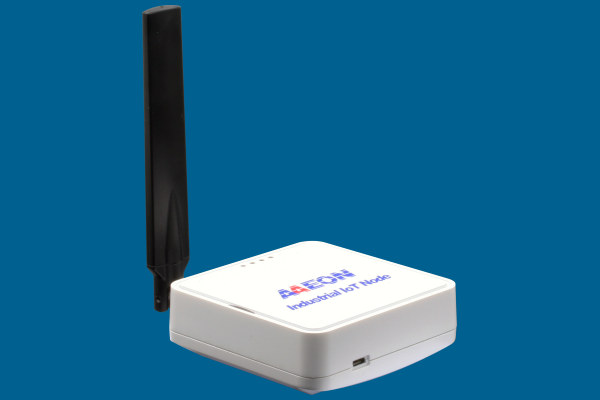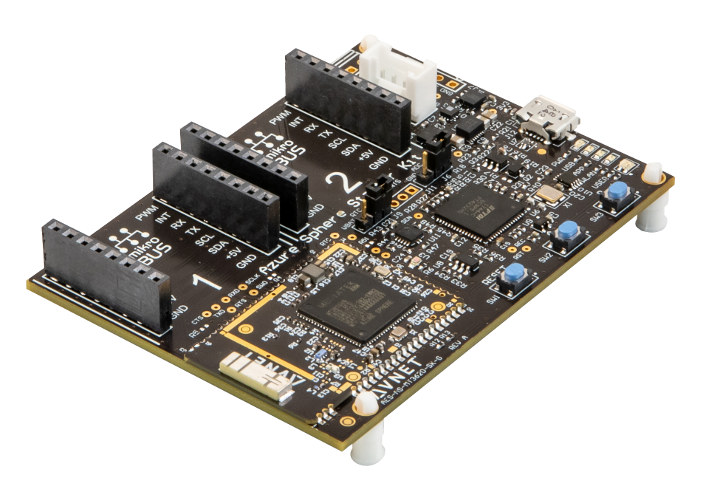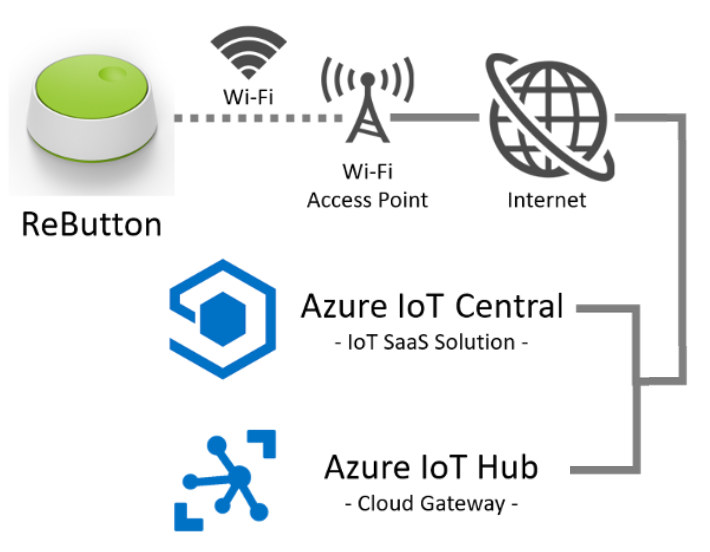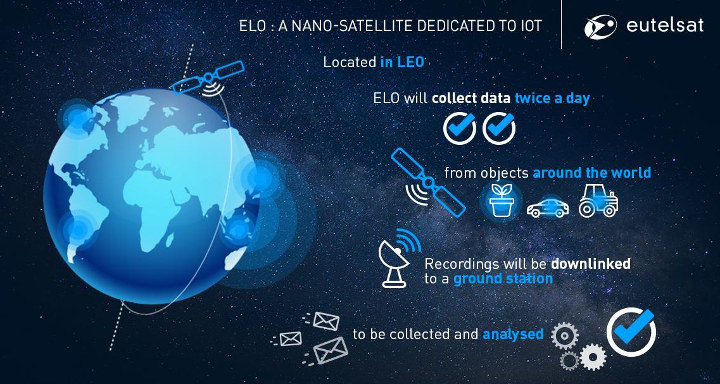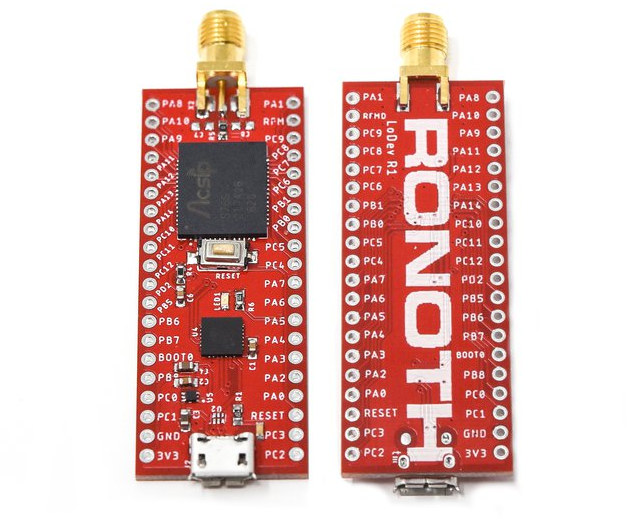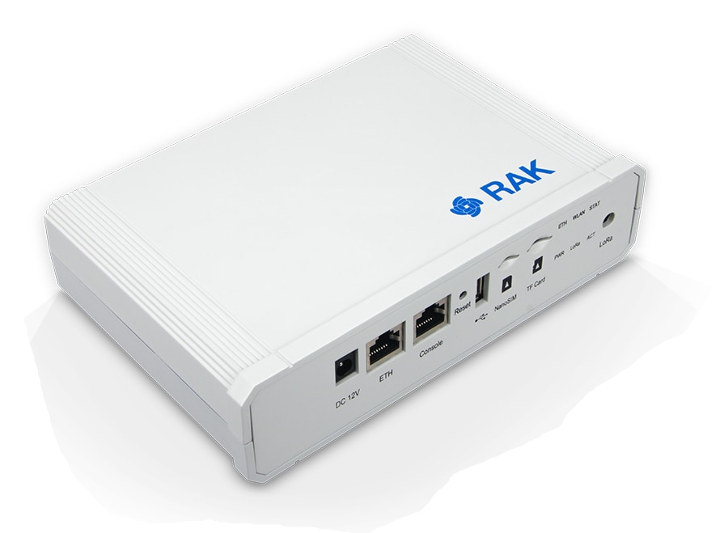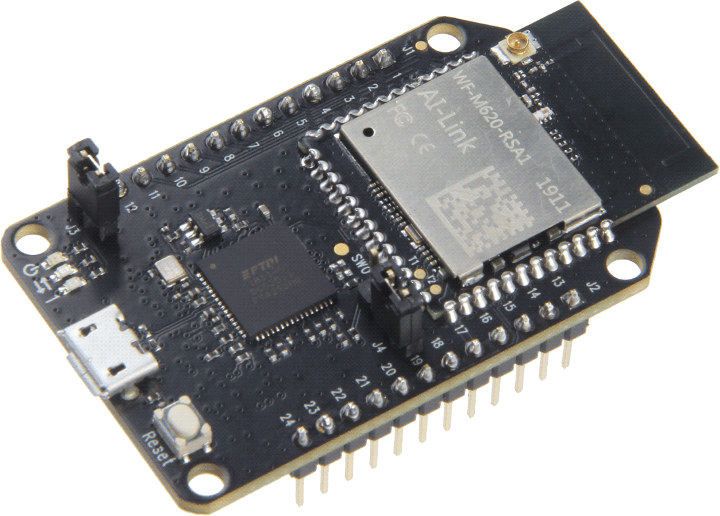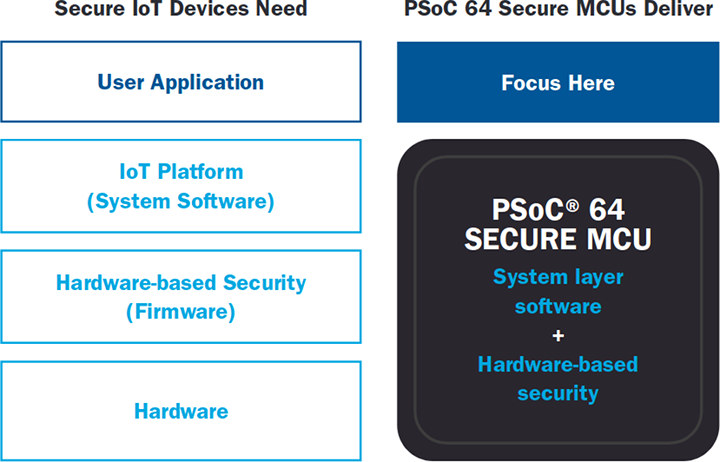AAEON specializes in industrial and embedded computing platforms, and usually their products are fairly powerful Windows or Linux based computers, gateways, or network appliances. But in order to provide a complete LoRa solution to system integrators, the company has now introduced AIOT-ILND01 LoRa node powered by STMicro STM32 MCU, and compatible with their AIOT-IP6801IP68 IoT Gateway, as well as other LoRa gateways. AIOT-ILND01 LoRa node specifications: MCU – STMicro STM32L Arm Cortex-M3 MCU @ 32 MHz Connectivity 868MHz/915 MHz LoRa via Semtech SX1276 chipset 1x SMA antenna hole, 1x IPEX antenna hole Sensors – Temperature & humidity sensor, 3-axis accelerometer Expansion – 3x GROVE connectors: 1x UART1 (RS-232/422/485), 1x UART2 (Tx/Rx), 1x I2C Misc – 4x user LEDs, boot select button, 2x user buttons, 1x reset button Debugging – JTAG header Power Supply 5V via micro USB port Battery holder for 2x 14500 rechargeable Lithium-ion battires or AA batteries Dimensions […]
Avnet Azure Sphere MT3620 Starter Kit Features Two mikroBUS Sockets
Microsoft and MediaTek worked together to design MediaTek MT3620 Arm Cortex-A7 processor with Microsoft Pluton security sub-system required for Microsoft Azure Sphere IoT ecosystem. We’ve already covered boards from Seeed Studio including the just announced low cost MT3620 mini dev board. But Microsoft also cooperated with Avnet which has recently introduced Azure Sphere MT3620 Starter Kit equipped with two mikroBUS sockets enabling the platform to leverage one of the 633 “click boards” available from MikroElektronika. Just like the latest Seeed Studio board, Avnet Azure Sphere MT3620 Starter Kit is comprised as a baseboard with a soldered-on CPU module that can later be used for mass-production is a custom designed board. Specifications: Azure Sphere MT3620 CPU Module Mediatek MT3620AN single core Arm Cortex-A7 processor @ 500 MHz with 4MB SRAM, dual core Arm Cortex-M4F real-time core @ 200 MHz with 64KB RAM, Microsoft Pluton security sub-system, and WiFi. Storage – TBD […]
ReButton WiFi Button Features MXCHIP EMW3166 Module
We’ve previously covered WiFi buttons based on ESP8266 processor, but Seeed Studio has just launched ReButton “developer device” that serves the same purpose but features STM32 based MXCHIP EMW3166 WiFi module instead, exposes one I2C grove connector, and is preloaded with sample firmware that triggers Azure IoT Central or Azure IoT Hub. ReButton hardware specifications: MCU module – MXCHIP EMW3166 module including STM32F412 Arm Cortex M4F MCU @ 100 MHz with 256KB SRAM, 1MB+2MB SPI Flash, and Cypress BCM43362 WiFi chip Input – 1x Push button Output – 1x RGB LED Extension – 1x I2C Grove connector (3.3V I/O) Debugging – 1x SWD pads, 1x UART for debugging Misc – 1x Jumper switch Power supply 2x AAA Alkaline batteries (LR03) Internal supply voltage – 3.3V Dimensions – 70 x 70 x 25mm The ReButton comes preloaded with an Arduino sketch that handle key presses and send a trigger to Azure […]
Sigfox Targets Worldwide Coverage with Satellite Launch
LPWAN technologies such as NB-IoT, Sigfox, and LoRa deliver low power, long range communication at low bitrate and can be used for asset tracking, environmental monitoring, water & electricity meters, and so on. The line-of-sight range between the closest gateway and nodes is usually 10 to 20 km, and coverage can be expanded by connecting several gateways to form a network. However, this is not workable in all locations worldwide, so Sigfox plans to launch a Sigfox satellite in collaboration with Eutelsat in order to provide coverage in places like large deserts such as the Sahara desert, the two poles, as well as oceans as explained by Franck Siegel, chief operating officer at Sigfox. This will for instance enable tracking and monitoring of oil platforms and vessels. The press release does not explains much except Sigfox and Eutelsat will test the first Satellite in H2 2019 before the commercial launch […]
LoDev S76S Board Combines STM32, LoRa and Arm Mbed Support (Crowdfunding)
There are already plenty of low power boards with a LoRa radio, but Ronoth offers another option with their tiny LoDev S76S LoRa development board featuring AcSip S76S SiP (system-in-package) with STMicro STM32L073 microcontroller, a Semtech SX1276 LoRa radio, and other components. While most hobbyist LoRa boards are designed to be programmed with the Arduino IDE, LoDev S76S is instead compatible with Arm Mbed. LoDev S76S board specifications: SiP – AcSip S76S system-in-package with STMicro STM32L073 Arm Cortex-M0+ microcontroller @ 48 MHz with 192 kB flash, 20 kB RAM Semtech SX1276 chip supporting global 863MHz ~ 928MHz ISM Bands RF front-end LoRa Connectivity Receiver Sensitivity – down to -146 dBm TX Power – adjustable up to +20 dBm Range – up to 15 km coverage in suburban areas and up to 5 km coverage in urban areas SMA antenna connector USB – 1x micro USB port for programming and power […]
RAK Wireless Launches RAK7258 Indoor LoRa Gateway for $149
RAK Wireless has just launched a new indoor LoRa gateway with their RAK7258 model featuring Semtech SX1301 8-channel digital baseband chip. The OpenWrt gateway supports Ethernet with PoE, 2.4GHz WiFi, optional NB-IoT, LTE Cat M, LTE 4G module, and is fully compatible with LoRaWAN 1.0.2. The gateway supports all main LoRa regions including EU433, CN470, EU868, US915, and AS923. RAK7258 gateway specifications: SoC – MediaTek MT7628 MIPS 24KEc processor @ 580 MHz System Memory – 128MB DDR2 RAM Storage – eMMC flash, microSD card slot Connectivity 10/100 Ethernet with PoE 802.11 b/g/n WiFi 4 with internal antenna LoRa via RAK833 mini PCIe card + RP-SMA antenna Cellular – Extended NB-IoT, Cat M, LTE 4G, supported by default; nano SIM card slot USB – 1x USB 2.0 host port Console – RJ45 RS-232 port Misc – 6x status LED Power Supply – 12V/2A (default) or 42-57V DC PoE Dimensions – 180 […]
MT3620 Mini Dev Board is a Cheaper Microsoft Azure Sphere Board
Announced nearly one year ago, Microsoft Azure Sphere is an ecosystem comprised of Azure MCUs with Microsoft Pluton Security System, Linux based Azure Sphere OS, and a secure cloud service called Azure Sphere Security Service. The first official Azure development board – MT3620 Development Board for Azure Sphere – was launched last year for $84.95. The kit may not have attracted a large number of developers, so there’s now a cheaper version – MT3620 Mini Dev board – going for $34.90 on Seeed Studio. Note that’s a pre-order and shipping is scheduled for May 13, 2019. MT3620 Mini dev board specifications: CPU Module – AI-Link WF-M620-RSA1 module with Mediatek MT3620AN single core Arm Cortex-A7 processor @ 500 MHz with 4MB SRAM, dual core Arm Cortex-M4F real-time core @ 200 MHz with 64KB RAM, Pluton security sub-system, and WiFi. Storage – 2x 8MB dual channel quad SPI (TBC) Connectivity – Dual band […]
Cypress PSoC 64 Microcontrollers Target Secure IoT Applications
If you are like me, you probably don’t remember, but back in 2017 Arm announced the Platform Security Architecture (PSA) that defines a set of requirements to secure low cost Internet of Things devices. There’s now at least one PSA compliant microcontroller, as Cypress Semiconductor introduced their PSoC 64 Secure MCU at Embedded World 2019 last month. The press release claims that PSoC 64 MCU family is one of “the first Arm Cortex-M processors to be certified as Level 1 compliant within the Arm Platform Security Architecture (PSA) certification scheme, PSA Certified, utilizing a secure Trusted Firmware-M (TF-M) implementation integrated into the Arm Mbed OS open-source embedded operating system”. PSoC 64 secure MCU key features and specifications: Arm Cortex-M4F core with 22‑µA/MHz active power consumption Optional Arm Cortex-M0+ core with 15‑µA/MHz power consumption System Memory – 160KB to 1MB SRAM Storage – 512KB to 2MB flash Security HW Cryptography – […]


